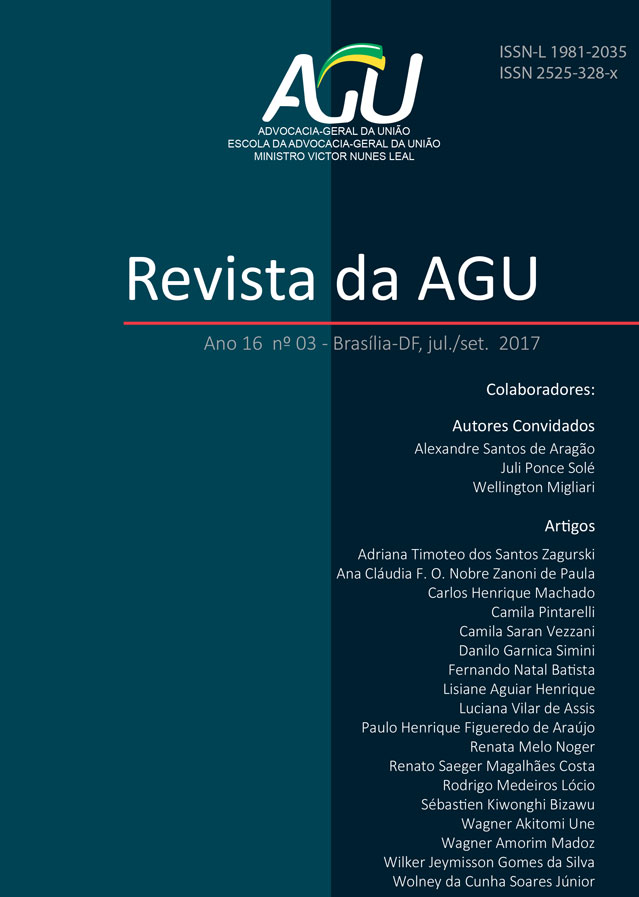GOOD ADMINISTRATION: THE PRINCIPLE OF TRANSPARENCY AND ITS USE BY THE INTERNATIONAL CIVIL SOCIETY
DOI:
https://doi.org/10.25109/2525-328X.v.16.n.03.2017.1936Palavras-chave:
Governance, Good Administration, Transparency, Comparative Public Law, Civil Society.Resumo
The principle of transparency is one of the cornerstones in governance debate. It orients more creditable practices for the making of public policies and draws citizens’ attention to the combat of corruption. In addition, less opaque relations in public-private businesses may strengthen the confidence of investors and tend to deconstruct asymmetric relations in long-running scenarios. Nonetheless, it is important to bring to the fore in that debate the birth of a transversal rationality that has forged civil society in the international community beyond the national borders. More and more, civil actors on social media networks organise debates and opinions from local platforms to elaborate worldwide topics. The aim of the present article is to suggest transparency as a local response born inside States and conceived by the civil society to confront abuses of global economic powers. Comparative analyses on constitutions and domestic legislations related to transparency usually show how asymmetric can be the perception of private investments and public sectors; the former mostly seen as virtuous and the latter vicious.
Referências
ALEXY, R. 2016. La Institucionalización de la Justicia. Granada: Editorial Comares.
AGAMBEN, Giorgio. 2007. The Coming Community. Minneapolis: Minnesota
University Press.
______. 2005. State of Exception. Chicago: University of Chicago Press.
BROWN, C. 1999. “History Ends, Worlds Collide”, Review of International
Studies, 25 (5): 41-57.
CASTELLS, M. 1983. The City and the Grassroots. Berkeley: California
University Press.
CHARLES R. BEITZ. 1979. “Bounded Morality: Justice and the State in
World Politics”, International Organization, 33 (3): 405-424.
CHEOL-SUNG LEE. 2007. “Labor Unions and Good Governance: A Cross-
National, Comparative Analysis”, American Sociological Review, 72 (4): 585-609.
COX, R. W. 1996. Approaches to World Order. Cambridge: Cambridge
University Press.
DWORKIN, Ronald. 2011. Justice for Hedgehogs. Cambridge: Harvard
University Press.
ELIZABETH BURLESON. 2010. “Non-State Actor Access and Influence
in International Legal and Policy Negotiations”, Proceedings of the Annual
Meeting (American Society of International Law), 104 (1): 325-328.
FRANCISCO GABRIEL RUIZ SOSA. 2014. “The Paradox of the Order and
Progress in Brazil: the Demonstrations before, during and after the 2014
World Cup”, Desbordes Revista de Investigaciones de la Escuela de Ciencias
Sociales, Artes y Humanidades, 5 (1): 91-96.
GOLDSTEIN, Judith, Miles Kahler, Robert O. Keohane and Anne-Marie
Slaughter. 2000. “Introduction: Legalization and World Politics”, International
Organization, 54 (3): 385–89.
GREVE, Carsten and Graeme Hodge. 2011. “Transparency in Public-Private
Partnerships: Some Lessons from Scandinavia and Australia”, paper presented
at the 1st Global Conference on Transparency Research Rutgers University,
-20 may, Newark.
HEALD, David. 2006. “Varieties of Transparency”, in Hood, Christopher and
David Heald (eds.), Transparency – The Key to Better Governance? Oxford:
Oxford University Press.
KAL RAUSTIALA. 2002. “The Architecture of International Cooperation:
Transgovernmental Networks and the Future of International Law”, Virginia
Journal of International Law, 43 (1): 1-103.
KUHNER, T. K. 2017. “Plutocracy and Partyocracy: the Corruption of Liberal
and Social Democracies”, in Cerrillo-i-Martínez, A. & Ponce, J., Preventing
corruption and promoting good government and public integrity. Brussels: Bruylant.
HENRÍQUEZ SALIDO, y Maria do Carmo. 2014. “La Fórmula in Dubio en
la Jurisprudencia Actual”, Revista de Llengua i Dret, 62 (1): 5-22.
MICK MOO RE. 1989. “The Fruits and Fallacies of Neoliberalism: the Case
of Irrigation Policy”. World Development, 17 (11): 1733-1750.
NEVES, M. 2013. Transconstitutionalism. Oxford: Hart Publishing.
PETER EVANS. 1996. “Government Action, Social Capital, and Development:
Reviewing the Evidence on Synergy”, World Development, 24 (6): 1119-1132.
POWELL, W. 1990. “Neither Market Nor Hierarchy: Network Forms of
Organization”, Research in Organizational Behavior, 12 (1): 295-336.
RAWLINGS, N. 2011. “First Days of a Revolution”, in Time (Ed.), What is
Occupy? Inside the Global Movement. New York: Time Books.
RAWLS, John. 1999. A Theory of Justice. Cambridge: Harvard University
Press.
REUS-SMIT, C. 2005. “Constructivism”, in Burchill, S. & et al. (Eds.),
Theories of International Relations. London: Palgrave Macmillan.
ROBERT W. Cox. 2000. “Thinking about Civilizations”, Review of
International Studies, 26 (5): 217–234.
SCHERER, M. 2011. “Introduction: taking it to the streets”, in Time (Ed.),
What is Occupy? Inside the Global movement. New York: Time Books.
SCHMITT, Carl. 2005. Political Theology. Chicago: University of Chicago
Press.
SOLE, Juli Ponce. 2011. “EU Law, Global Law and the Right to Good
administration”, in Chiti, Edoardo and Bernardo Giorgio Matarella (eds.),
Global Administrative Law and EU Administrative Law. Relationships, Legal
Issues and Comparisons. Berlín: Springer.
SOUZA, Jessé. 2015. A Tolice da Inteligência Brasileira. São Paulo: Leya.
______. 2016. A Radiografia do Golpe. São Paulo: Casa da Palabra-Ley.
W. MIGLIARI. 2016. “São Paulo, Warsaw and landlocked Areas: from
Functionality to Proto-Right to the City”, Studia Juridica, 63 (1): 175-194.
Downloads
Publicado
Como Citar
Edição
Seção
Licença
Copyright (c) 2018 REVISTA DA AGU

Este trabalho está licenciado sob uma licença Creative Commons Attribution-NonCommercial-NoDerivatives 4.0 International License.
Autores que publicam nesta Revista concordam com os seguintes termos:
- os autores mantêm os direitos autorais e concedem à Revista da AGU o direito de primeira publicação;
- os autores têm autorização para assumir contratos adicionais separadamente, para distribuição não exclusiva da versão do trabalho publicada nesta Revista (ex.: publicar em repositório institucional ou como capítulo de livro), com reconhecimento de autoria e publicação inicial nesta Revista.

